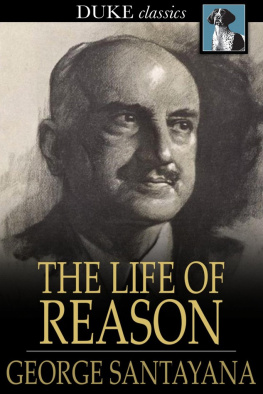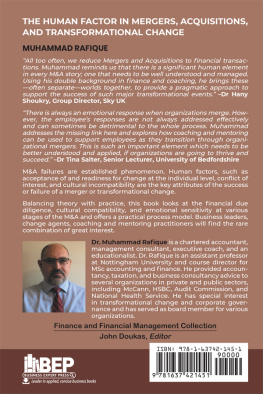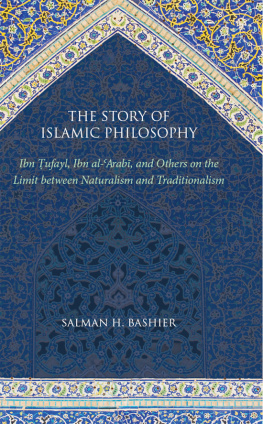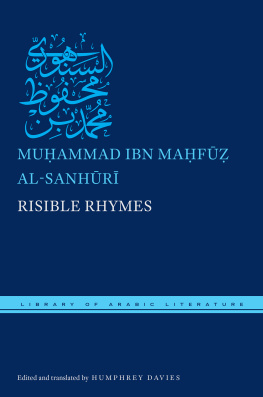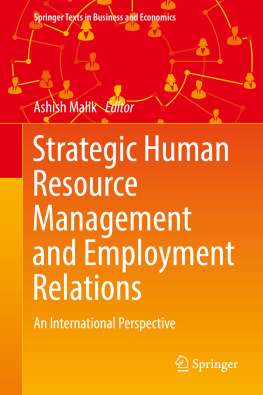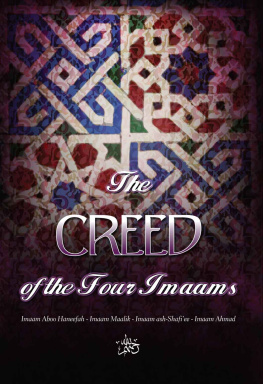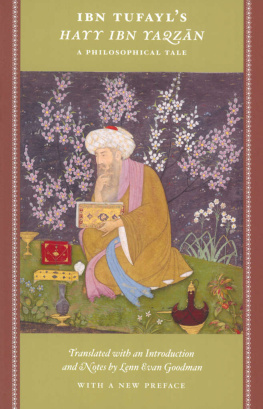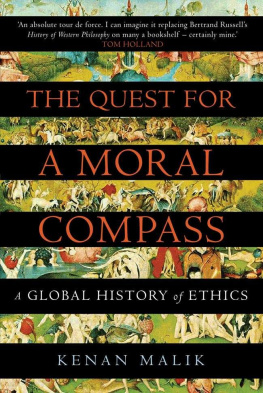Muhammad ibn Abd al-Malik Ibn Tufayl - The Improvement of Human Reason: Exhibited in the Life of Hai Ebn Yokdhan
Here you can read online Muhammad ibn Abd al-Malik Ibn Tufayl - The Improvement of Human Reason: Exhibited in the Life of Hai Ebn Yokdhan full text of the book (entire story) in english for free. Download pdf and epub, get meaning, cover and reviews about this ebook. year: 2005, genre: Science. Description of the work, (preface) as well as reviews are available. Best literature library LitArk.com created for fans of good reading and offers a wide selection of genres:
Romance novel
Science fiction
Adventure
Detective
Science
History
Home and family
Prose
Art
Politics
Computer
Non-fiction
Religion
Business
Children
Humor
Choose a favorite category and find really read worthwhile books. Enjoy immersion in the world of imagination, feel the emotions of the characters or learn something new for yourself, make an fascinating discovery.

- Book:The Improvement of Human Reason: Exhibited in the Life of Hai Ebn Yokdhan
- Author:
- Genre:
- Year:2005
- Rating:4 / 5
- Favourites:Add to favourites
- Your mark:
- 80
- 1
- 2
- 3
- 4
- 5
The Improvement of Human Reason: Exhibited in the Life of Hai Ebn Yokdhan: summary, description and annotation
We offer to read an annotation, description, summary or preface (depends on what the author of the book "The Improvement of Human Reason: Exhibited in the Life of Hai Ebn Yokdhan" wrote himself). If you haven't found the necessary information about the book — write in the comments, we will try to find it.
The Improvement of Human Reason: Exhibited in the Life of Hai Ebn Yokdhan — read online for free the complete book (whole text) full work
Below is the text of the book, divided by pages. System saving the place of the last page read, allows you to conveniently read the book "The Improvement of Human Reason: Exhibited in the Life of Hai Ebn Yokdhan" online for free, without having to search again every time where you left off. Put a bookmark, and you can go to the page where you finished reading at any time.
Font size:
Interval:
Bookmark:
The Project Gutenberg EBook of The Improvement of Human Reason, by Ibn Tufail
This eBook is for the use of anyone anywhere at no cost and withalmost no restrictions whatsoever. You may copy it, give it away orre-use it under the terms of the Project Gutenberg License includedwith this eBook or online at www.gutenberg.net
Title: The Improvement of Human Reason Exhibited in the Life of Hai Ebn Yokdhan
Author: Ibn Tufail
Release Date: October 8, 2005 [EBook #16831]
Language: English
*** START OF THIS PROJECT GUTENBERG EBOOK THE IMPROVEMENT OF HUMAN REASON ***
Produced by Marc D'Hooghe
Exhibited in the Life
of Hai Ebn Yokdhan
by
Ibn Tufail (Abu Bakr Muhammad Ibn Tufail al-Qasi)
Newly Translated from the Original Arabick by Simon Ockley
(1708)
* * * * *
The Improvement of
Exhibited in the LIFE of
Hai Ebn Yokdhan:
Written in Arabick above 500 Years _ago, by Abu Jaafar Ebn Tophail.
In which is demonstrated,
By what Methods one may, by the meer LIGHT OF NATURE, attain the Knowledg of things NATURAL and SUPERNATURAL; more particularly the Knowledg of God, and the Affairs of another Life.
Illustrated with proper FIGURES,
Newly Translated from the Original Arabick
by SIMON OCKLEY, A.M. Vicar of
Swanesey in Cambridgshire.
With an APPENDIX,
In Which the Possibility of Man's attaining
the True Knowledg of GOD, and
Things necessary to Salvation, without
INSTRUCTION, is briefly consider'd.
* * * * *
To the Reverend
Mr. Edward Pococke,
Rector of
MINAL, in Wiltshire.
Reverend SIR,
Hai Ebn Yokdhan returns to you again, in a Dress different from thatwhich you sent him out in. Wherever he comes, he acknowledges you forhis first and best Master; and confesses, that his being put in aCapacity to travel thro' Europe, _is owing to your Hand. I could not inEquity send him to any other Person, you being the sole Proprietor. Andas your Learning enables you to do him Justice, so your Candor willincline you to pardon what is by me done amiss. Both whichQualifications you enjoy, as a Paternal Inheritance, descending from theReverend and Learned Dr. Pococke, the Glory and Ornament of our Ageand Nation. Whose Memory I much reverence, and how much I acknowledge myself indebted to him for his Learned Works, I thought I could no wayexpress better, than by taking some Opportunity to pay my Respects toyou, Sir, the worthy Son of so great a Father. And no fitter Bearerthan_ Hai Ebn Yokdhan, with whose Character and Language you are sowell acquainted, and to whom you have long ago shown so great a Respect,that I have no reason to fear but he will be welcome.
I am,
Your most humble Servant,
Simon Ockley,
* * * * *
When Mr. Pococke first publish'd this Arabick Author with hisaccurate Latin Version, Anno 1671. Dr. Pococke his Father, thatlate eminent Professor of the Oriental Languages in the University ofOxford, prefix'd a Preface to it; in which he tells us, that he hasgood Reason to think, that this Author was contemporary with Averroes,who died very ancient in the Year of the Hegira 595, which isco-incident with the 1198th Year of our Lord; according to which Account,the Author liv'd something above five hundred Years ago.
He liv'd in Spain, as appears from one or two Passages in this Book.He wrote some other Pieces, which are not come to our Hands. This hasbeen very well receiv'd in the East; one Argument of which is, that ithas been translated by R. MosesNarbonensis into Hebrew, andillustrated with a large Commentary. The Design of the Author is toshew, how Human Capacity, unassisted by any External Help, may, by dueApplication, attain to the Knowledge of Natural Things, and so byDegrees find out its Dependance upon a Superior Being, the Immortalityof the Soul, and all things necessary to Salvation.
How well he has succeeded in this Attempt, I leave to the Reader tojudge. 'Tis certain, that he was a Man of Parts and very good Learning,considering the Age he liv'd in, and the way of studying in those Times.There are a great many lively Stroaks in it; and I doubt not but ajudicious Reader will find his Account in the Perusal of it.
I was not willing ('though importun'd) to undertake the translating itinto English, because I was inform'd that it had been done twicealready; once by Dr. Ashwell, another time by the Quakers, whoimagin'd that there was something in, it that favoured theirEnthusiastick Notions. However, taking it for granted, that both theseTranslations we're not made out of the Original Arabick, but out ofthe Latin; I did not question but they had mistaken the Sense of theAuthor in many places. Besides, observing that a great many of myfriends whom I had a desire to oblige, and other Persons whom I wouldwillingly incline to a more favourable Opinion of Arabick Learning,had not seen this Book; and withal, hoping that I might add something byway of Annotation or Appendix, which would not be altogether useless;I at last ventur'd to translate it a-new.
I have here and there added a Note, in which there is an account givenof some, great Man, some Custom of the Mahometans explain'd, orsomething of that Nature, which I hope will not be unacceptable. Andlest any Person should, through mistake, make any ill use of it, I havesubjoin'd an Appendix, the Design of which the Reader may see in itsproper place.
* * * * *
When I first undertook the Publication of this English Translation, Ithought it would not be amiss to present the World with a Specimen of itfirst. But since the Introduction is such, that the Reader can no moreby it give a Guess at what is contain'd in the Book itself, than a Mancan judge of his Entertainment by seeing the Cloath laid; I have thoughtit necessary to give him a Bill of Fare.
The Design of the Author (who was a Mahometan Philosopher) is to shewhow Humane Reason may, by Observation and Experience, arrive at theKnowledge of Natural Things, and from thence to Supernatural;particularly the Knowledge of God and a Future State. And in order tothis, he supposes a Person brought up by himself where he wasaltogether destitute of any Instruction, but what he could get from hisown Observation.
He lays the Scene in some Fortunate Island situate under theEquinoctial; where he supposes this Philosopher, either to have beenbred (according to Avicen_'s Hypothesis, who conceiv'd a possibility ofa Man's being formed by the Influence of the Planets upon Matter rightlydisposed) without either Father or Mother; or self-expos'd in hisInfancy, and providentially suckled by a Roe. Not that our Authorbeliev'd any such matter, but only having design'd to._
He lays the Scene in some Fortunate Island situate under theEquinoctial; where he supposes this Philosopher, either to have beenbred (according to Avicen_'s Hypothesis, who conceiv'd a possibility ofa Man's being formed by the Influence of the Planets upon Matter rightlydisposed) without either Father or Mother; or self-expos'd in hisInfancy, and providentially suckled by a Roe. Not that our Authorbeliev'd any such matter, but only having design'd to contrive aconvenient place for his Philosopher, so as to leave him to Reason byhimself, and make his Observations without any Guide. In which Relation,he proposes both these ways, without speaking one Word in favour ofeither_.
Next pageFont size:
Interval:
Bookmark:
Similar books «The Improvement of Human Reason: Exhibited in the Life of Hai Ebn Yokdhan»
Look at similar books to The Improvement of Human Reason: Exhibited in the Life of Hai Ebn Yokdhan. We have selected literature similar in name and meaning in the hope of providing readers with more options to find new, interesting, not yet read works.
Discussion, reviews of the book The Improvement of Human Reason: Exhibited in the Life of Hai Ebn Yokdhan and just readers' own opinions. Leave your comments, write what you think about the work, its meaning or the main characters. Specify what exactly you liked and what you didn't like, and why you think so.

